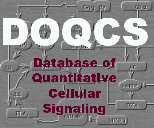
|
Enter a Search String | | Special character and space not allowed in the query term.
Search string should be at least 2 characters long. |
Molecule Parameter List for BetaGamma | The statistics table lists the distribution of a molecule acting either as a substrate, product, enzyme or as a molecule within the network.
The text color of a molecule is highlighted by  color. color. | | Statistics |
Accession and Pathway Details | |
| Accession Name | Accession No. | Accession Type | Pathway Link | Ajay_Bhalla_
2004_Feedback_
Tuning | 78 | Network |
Shared_Object_Ajay_Bhalla_2004_Feedback_Tuning, PKC, PLA2,
PLCbeta, Gq, MAPK,
Ras, EGFR, Sos,
PLC_g, CaMKII, CaM,
PP1, PP2B, PKA,
AC | | This model is taken from Ajay SM, Bhalla US. Eur J Neurosci. 2004 Nov;20(10):2671-80. This is the feedback model from Figure 8a. |
BetaGamma acting as a Molecule in Ajay_Bhalla_2004_Feedback_Tuning Network
| Name | Accession Name | Pathway Name | Initial Conc.
(uM) | Volume
(fL) | Buffered | | BetaGamma | Ajay_Bhalla_
2004_Feedback_
Tuning
Accession No. : 78 | Shared_Object_
Ajay_Bhalla_
2004_Feedback_
Tuning
Pathway No. : 347 | 0 | 1.5 | No | | These exist in a nebulous sense in this model, basically only to balance the conservation equations. The details of their reassociation with G-GDP are not modeled Resting level =0.0094, stim level =.0236 from all42.g ish. |
BetaGamma acting as a Substrate in a reaction in Ajay_Bhalla_2004_Feedback_Tuning Network
| Kd is calculated only for second order reactions, like nA+nB <->nC or nA<->nC+nD, where n is number and A,B,C,D are molecules, where as for first order reactions Keq is calculated.
Kd for higher order reaction are not consider. |
| | Name | Accession Name | Pathway Name | Kf | Kb | Kd | tau | Reagents | | 1 | Trimerize-G | Ajay_Bhalla_
2004_Feedback_
Tuning
Accession No. : 78 | Gq
Pathway No. : 351 | 6
(uM^-1 s^-1) | 0
(s^-1) | - | - | Substrate
BetaGamma
G*GDP
Product
G-GDP
| | | kf == kg3 = 1e-5 /cell/sec. As usual, there is no back-reaction kb = 0 | | 2 | bg-act-GEF | Ajay_Bhalla_
2004_Feedback_
Tuning
Accession No. : 78 | Ras
Pathway No. : 353 | 6
(uM^-1 s^-1) | 1
(s^-1) | Kd(bf) = 0.1667(uM) | - | Substrate
BetaGamma
inact-GEF
Product
GEF-Gprot-bg
| | | SoS/GEF is present at 50 nM ie 3e4/cell. BetaGamma maxes out at 9e4. Assume we have 1/3 of the GEF active when the BetaGamma is 1.5e4. so 1e4 * kb = 2e4 * 1.5e4 * kf, so kf/kb = 3e-5. The rate of this equil should be reasonably fast, say 1/sec |
BetaGamma acting as a Product in a reaction in Ajay_Bhalla_2004_Feedback_Tuning Network
| Kd is calculated only for second order reactions, like nA+nB <->nC or nA<->nC+nD, where n is number and A,B,C,D are molecules, where as for first order reactions Keq is calculated.
Kd for higher order reaction are not consider. |
| | Name | Accession Name | Pathway Name | Kf | Kb | Kd | tau | Reagents | | 1 | Basal-Act-G | Ajay_Bhalla_
2004_Feedback_
Tuning
Accession No. : 78 | Gq
Pathway No. : 351 | 0.0001
(s^-1) | 0
(uM^-1 s^-1) | - | - | Substrate
G-GDP
Product
BetaGamma
G*GTP
| | | kf = kg1 = 0.01/sec, kb = 0. This is the basal exchange of GTP for GDP. | | 2 | Activate-Gq | Ajay_Bhalla_
2004_Feedback_
Tuning
Accession No. : 78 | Gq
Pathway No. : 351 | 0.01
(s^-1) | 0
(uM^-2 s^-1) | - | - | Substrate
Rec-Glu-Gq
Product
BetaGamma
G*GTP
Rec-Glu
| | | This is the kcat==k3 stage of the Rec-Glu ezymatic activation of Gq. From Berstein et al actiation is at .35 - 0.7/min From Fay et al Biochem 30 5066-5075 1991 kf = .01/sec From Nakamura et al J physiol Lond 474:1 35-41 1994 see time courses. Also (Berstein) 15-40% of gprot is in GTP-bound form on stim. |
| Database compilation and code copyright (C) 2022, Upinder S. Bhalla and NCBS/TIFR
This Copyright is applied to ensure that the contents of this database remain freely available. Please see FAQ for details. |
|
